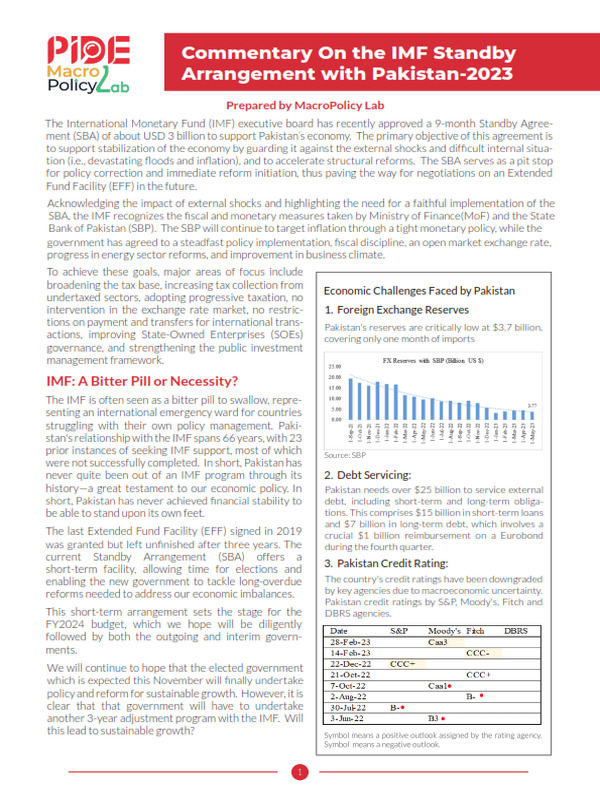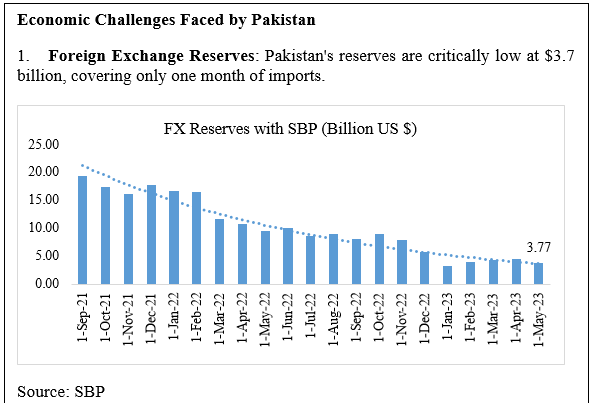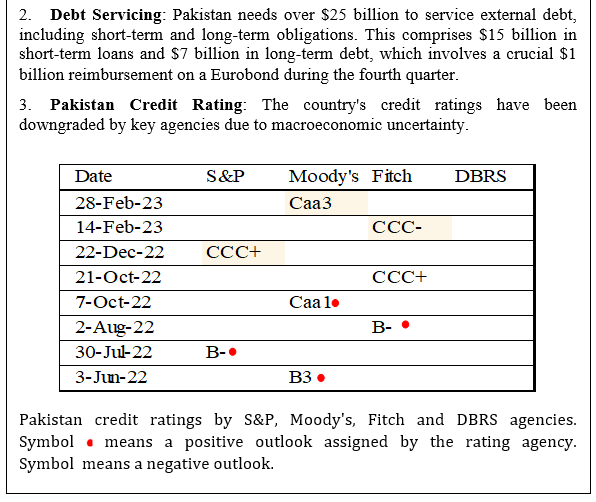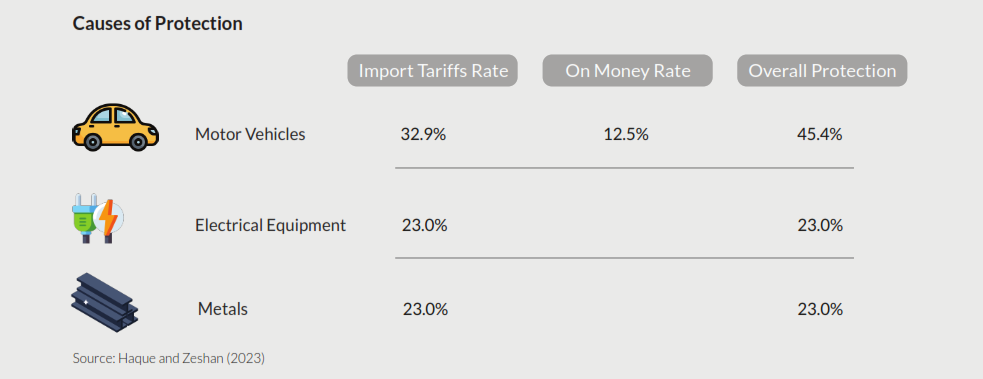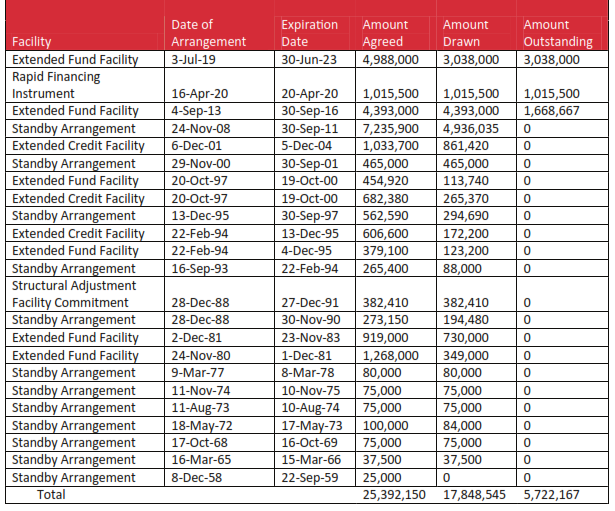Commentary On the IMF Standby Arrangement with Pakistan-2023
The International Monetary Fund (IMF) executive board has recently approved a 9-month Standby Agreement (SBA) of about USD 3 billion to support Pakistan’s economy. The primary objective of this agreement is to support stabilization of the economy by guarding it against the external shocks and difficult internal situation (i.e., devastating floods and inflation), and to accelerate structural reforms. The SBA serves as a pit stop for policy correction and immediate reform initiation, thus paving the way for negotiations on an Extended Fund Facility (EFF) in the future.
Acknowledging the impact of external shocks and highlighting the need for a faithful implementation of the SBA, the IMF recognizes the fiscal and monetary measures taken by Ministry of Finance(MoF) and the State Bank of Pakistan (SBP). The SBP will continue to target inflation through a tight monetary policy, while the government has agreed to a steadfast policy implementation, fiscal discipline, an open market exchange rate, progress in energy sector reforms, and improvement in business climate.
To achieve these goals, major areas of focus include broadening the tax base, increasing tax collection from undertaxed sectors, adopting progressive taxation, no intervention in the exchange rate market, no restrictions on payment and transfers for international transactions, improving State-Owned Enterprises (SOEs) governance, and strengthening the public investment management framework.
IMF: A Bitter Pill or Necessity?
The IMF is often seen as a bitter pill to swallow, representing an international emergency ward for countries struggling with their own policy management. Pakistan’s relationship with the IMF spans 66 years, with 23 prior instances of seeking IMF support, most of which were not successfully completed. In short, Pakistan has never quite been out of an IMF program through its history—a great testament to our economic policy. In short, Pakistan has never achieved financial stability to be able to stand upon its own feet.
The last Extended Fund Facility (EFF) signed in 2019 was granted but left unfinished after three years. The current Standby Arrangement (SBA) offers a short-term facility, allowing time for elections and enabling the new government to tackle long-overdue reforms needed to address our economic imbalances.
This short-term arrangement sets the stage for the FY2024 budget, which we hope will be diligently followed by both the outgoing and interim governments.
We will continue to hope that the elected government which is expected this November will finally undertake policy and reform for sustainable growth. However, it is clear that that government will have to undertake another 3-year adjustment program with the IMF. Will this lead to sustainable growth?
Proposed Agenda for the New Government after the Election
It is crucial to recognize that the IMF is not a solution to our problems, but rather a temporary fix. Sadly, the euphoria that has surrounded the recent announcement of the standby suggests otherwise.
If we are to get out of repeated IMF programs and attain a sustainable growth path, the new government must be prepared to undertake serious reform.
For this purpose, PIDE has suggested the following reforms on an emergency basis:
- Governance: The outdated governance model in Pakistan, inherited from the colonial era, has relied on excessive centralization as well as marginalization of professional management of key resources.
- SOEs/Government Agencies: The government’s extensive presence in the economy through various SOEs and agencies has resulted in accumulating losses. Urgent reforms are required, including privatization, merging of similar agencies, shutting down unnecessary ones, and implementing effective governance for retained SOEs. However, conscientious deliberations are highly needed in the privatization process to avoid any unprofitable or disadvantageous situation down the road.
- Deregulation: Overregulation has acted as a barrier to economic growth. Immediate deregulation is necessary to reduce unnecessary regulations, eliminate the NOC culture, and establish a rule-based regulatory regime that encourages economic activity. Nonetheless, regulations are necessary for reforms and public institutions should make only imperative regulations according to the market needs.
- Tax Reforms: The tax administration needs an overhaul to simplify procedures and facilitate tax payments. On the policy front, the focus should shift from burdening existing taxpayers to expanding economic activity and increasing tax compliance. Rationalizing tax rates and tariffs is crucial to encourage transactions and improve tax compliance.
- Energy Sector: Reforms in the energy sector, such as tariff adjustments, are essential to address circular debt. However, solely relying on tariff increases may not lead to long-term efficiency and can contribute to inflation and higher production costs.
- Fiscal Reforms: IMF recommendations focus on taxation measures, SOEs governance, and public investment management. Broadening the tax net and increasing taxes on undertaxed sectors are suggested. However, the focus on burdening existing taxpayers and assuming undertaxed sectors may discourage economic activity and hinder growth. Low hanging fruit can be moving to a zero based budgeting for all government agencies.
- Utilizing Dead Public Capital: Revenue generation should not rely solely on taxes. The government should explore non-tax revenue sources, such as utilizing government-owned land and underutilized infrastructure. These assets can be developed through private sector investment, generating revenue and stimulating economic activity.
- Forex Markets: The SBA recommends a free and unrestricted foreign exchange framework, including the elimination of import restrictions and administrative barriers. Though repatriation of profits by foreign companies is encouraged for efficient business operations, State Bank of Pakistan, being the custodian of the financial system, is recommended not to ignore the risk of currency speculations and the resulting risks in the forex market.
- Proactive Inflation Management: The central bank is advised to remain proactive in reducing inflation, demonstrated by recent policy rate hikes. Moreover, the civil management i.e., food price control authorities, should act against the unjust arbitrage practices in the markets to bring down the prices of the goods part of consumers basic food basket.
- Pension Reforms: The growing pension bill requires urgent reforms, including shifting to fully funded pensions based on a contributory system. Multiple pensions and tiers of recipients should be reduced.
- Productivity: Attracting more investment is crucial for sustainable economic growth. Pakistan’s productivity lags comparable countries, and structural reforms, such as financial sector restructuring, privatization, liberalization, and deregulation, are needed to foster a market-led economy and enhance productivity and economic growth.
In conclusion, while the IMF deal offers benefits and challenges, it is important to recognize that the IMF is not a long-term solution for Pakistan’s economic issues. The new government must focus on local thought and ideas to lead structural reforms instead of relying solely on donor-led policies, which have not been successful in the past. By implementing these reforms, Pakistan can achieve economic stability and sustainable growth.
|
Power Sector an Enigma with No Easy Solution
Source: Cheema et al., 2022, Malik, 2023 |
|
PIDE Recommends Rationalizing Tax Rates and Adopting a Fair Universal Taxation System PIDE recommends that the tax rates must be rationalized in the economy. A fair universal taxation system must be adopted with no exemptions to any income earners, including agriculture. The withholding regime must be narrowed, and especially must eliminate revenue non-spinners, i.e., multiple withholding taxes that generate less than one percent of total revenue, but taxpayers have to bear high documentation and time costs due to such taxes. Furthermore, the import duties must also be rationalized and lowered to a fair level where the government is able to collect its deserved revenue, but businesses and economic activity does not suffer due to imposition of such duties. Measures such as super tax must be avoided as they discourage business activity and discourage businesses from achieving higher efficiency. (See PIDE work on doing tax better by Nasir, et al., 2020) |
PIDE Research Urges Reconsideration of Import Restrictions: Managing Risks and Addressing Tariff Cascading
|
|
Increases in Policy Rate and Impact on Government Debt Servicing and Credit Restrictions Increase in policy rates have actually not been very effective in case of Pakistan and leads to significant increase in the debt servicing cost for the government (because most of the government long term debt is on floating rates). More than sixty percent of the credit goes to the government, there are credit restrictions such as SMEs, subsidies credits, Agriculture credits etc. Along with this there is significant increase in money supply through Net foreign assets (NFA) and Net domestic assets (NDA) changes reducing the benefit of policy rate changes altogether. (See PIDE research report on Balancing Growth and Inflation Targets with Monetary Policy, 2023). (See PIDE work on doing tax better by Nasir, et al., 2020) |
References
The analysis and suggestions presented are based on the following works done at PIDE:
Basharat, T., Haque, N., & Malik, A. (2022). Power Sector, An Enigma with no Solution. PIDE. RASTA. Retrieved from https://pide.org.pk/research/power-sector-an-enigma-with-no-easy-solution/
Faraz, N., Siddque, O., & Saeed, A. (2023). Sectoral Total Factor Productivity in Pakistan. Islamabad: Pakistan Institute of Development Economics.
Haque, N., Nayab, D., Siddique, O., & Faraz, N. (2021). Cash Poor, Perks Rich! Civil Service Compensation: Incentives, Dissatisfaction, And Costs. PIDE. Retrieved from https://pide.org.pk/research/cash-poor-perk-rich-civil-service-compensation-incentives-dissatisfaction-and-costs/
Haque, N., Qasim, A. W., & Khan, F. J. (2023). PIDE Sludge Audit (Vol. 2). RASTA. Retrieved from https://pide.org.pk/research/pide-sludge-audit-vol-2/
Haque, N., Qasim, A. W., & Khwaja, I. (2022). PIDE Sludge Audit (Vol. 1). RASTA. Retrieved from https://pide.org.pk/research/pide-sludge-audit-vol-1/
Najib, M. S. (2022). Will The Import Ban Prove Its Effectiveness? PIDE. Retrieved from https://pide.org.pk/research/will-the-import-ban-prove-its-effectiveness/
Nasir, M., Faraz, N., & Anwar, S. (2020). Doing Taxes Better: Simplify, Open And Grow Economy. PIDE. Retrieved from https://pide.org.pk/research/doing-taxes-better-simplify-open-and-grow-economy/
PIDE. (2021). The Reform Agenda for Accelarated and Sustained Growth. Retrieved from https://pide.org.pk/research/the-pide-reform-agenda-for-accelerated-and-sustained-growth/
PIDE. (2022). Charter of Economy: Petition to all the Political Leaders/Parties of Pakistan. PIDE. Retrieved from https://pide.org.pk/research/pides-charter-of-economy-petition-to-all-the-political-leaders-parties-of-pakistan/
PIDE. (2022). Commentary on the 23rd IMF Program for Pakistan. Retrieved from https://pide.org.pk/research/pide-commentary-on-the-23rd-imf-program-for-pakistan/
PIDE. (2022). Pakistan One Year Growth Strategy. Retrieved from https://pide.org.pk/research/pakistan-one-year-growth-strategy/
PIDEMacroPolicyLab. (2023). Balancing Growth and Inflation Targets with Monetary Policy. PIDE. Retrieved from https://pide.org.pk/research/balancing-growth-and-inflation-targets-with-monetary-policy/
PIDEMacroPolicyLab. (2023). Maximizing the Impact: Evaluating the FY 2023-24 Budget for Optimal Resource Allocation, Socio-Economic Addressal, and Sustainable Development. PIDE. Retrieved from https://pide.org.pk/research/maximizing-the-impact-evaluating-the-fy-2023-24-budget-for-optimal-resource-allocation-socio-economic-addressal-and-sustainable-development/
PIDEMacroPolicyLab. (2023). The Pre-Budget Policy Recommendations: Optimizing Fiscal Resource Allocation in Pakistan. PIDE. Retrieved from https://pide.org.pk/research/the-pre-budget-policy-recommendations-optimizing-fiscal-resource-allocation-in-pakistan/
Zeshan, M. (2022). Import Tariffs And Trade Balance In Pakistan. PIDE. Retrieved from https://pide.org.pk/research/import-tariffs-and-trade-balance-in-pakistan/
Zeshan, M. (2022). Is a multilateral full trade liberalization policy effective in Pakistan? PIDE. Retrieved from https://pide.org.pk/research/is-a-multilateral-full-trade-liberalization-policy-effective-in-pakistan/
Zeshan, M. (2022). Unveiling The Myth Of Import Substitution Policy In Pakistan. PIDE. Retrieved from https://pide.org.pk/research/unveiling-the-myth-of-import-substitution-policy-in-pakistan/
Appendix
Pakistan’s History of Lending Commitments ((In thousands of SDRs)


